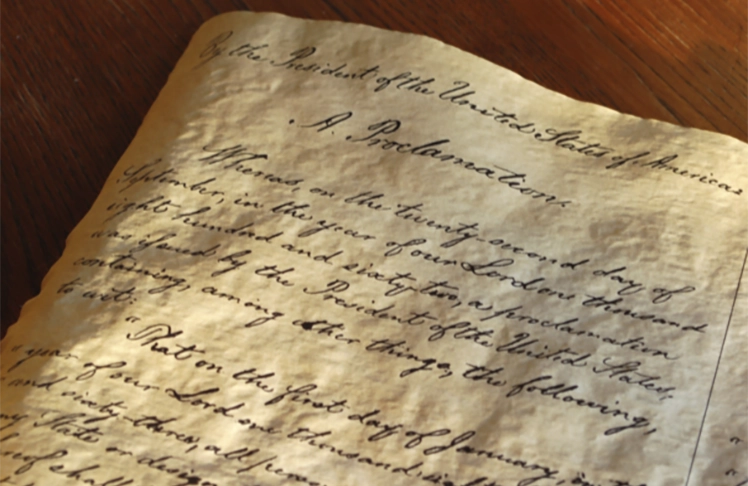
By Aaron Allen, The Seattle Medium
As Black communities across the United States prepare to celebrate Juneteenth, the holiday offers more than just a day of remembrance—it is a time to reflect deeply on the enduring struggle for freedom. Though President Abraham Lincoln issued the Emancipation Proclamation on January 1, 1863, enslaved African Americans in Texas did not learn of their liberation until federal troops arrived in Galveston more than two years later, on June 19, 1865.
That moment marked the beginning of Juneteenth, now recognized as the oldest nationally celebrated commemoration of slavery’s end in the United States. But the path to freedom was far from immediate or complete. Juneteenth highlights the resilience, sacrifice, and enduring strength of African Americans, and challenges us to confront historical truths often omitted from mainstream narratives.
The Emancipation Proclamation was heralded as a major turning point, but its power was limited in practical terms. At the time of its issuance, no Confederate territory had yet fallen under Union control. While the proclamation declared all enslaved people in Confederate states to be free, it could not be enforced where Union authority did not exist.
“During the period prior to the 13th Amendment, it wasn’t politically, strategically, personally or practically possible to free all enslaved people,” the article notes. The reality was that Lincoln’s primary focus remained the preservation of the Union. As he wrote to newspaper editor Horace Greeley on August 22, 1862, “If I could save the Union without freeing any slave, I would do it, and if I could save it by freeing all the slaves, I would do it.”
This statement reveals the tension between moral obligation and political strategy. Many Union soldiers had enlisted to preserve the Union, not to fight for the abolition of slavery. An overt emphasis on emancipation might have jeopardized morale, recruitment, and support from the border states. As a result, Lincoln issued the Emancipation Proclamation both to pacify abolitionists and to strategically weaken the Confederacy by encouraging enslaved people to escape or aid the Union cause.
Still, the proclamation had limited immediate effect. Most enslaved people in the South did not hear of it until much later, and in places like Texas, slavery persisted until Union forces could enforce the decree. Juneteenth commemorates that enforcement on June 19, 1865—but even then, full legal abolition did not come until the ratification of the 13th Amendment on December 6, 1865.
Black Americans were instrumental in bringing about the end of slavery. As the article states, “Black Americans during the time of slavery… played a major role in bringing an end to bondage.” Nearly 180,000 Black soldiers served in the Union Army by the end of the Civil War. Their involvement proved pivotal in securing Union victory and redefining the war’s moral and political stakes.
However, the ratification of the 13th Amendment introduced a legal loophole that would carry devastating consequences. The amendment abolished slavery “except as a punishment for crime,” a clause that gave rise to a new form of forced labor through the penal system.
This systemic flaw is described by American linguist and political commentator Noam Chomsky.
“The Constitutional amendments during and after the Civil War were supposed to free African American slaves… but then there was the North-South Compact, which essentially granted former slave-owning states the right to do whatever they wanted. And what they did was criminalize Black life in all kinds of ways,” said Chomsky.
“That created a kind of a slave force, it threw mostly Black males and females into jails where they became the perfect labor force. Much better than slaves. If you are a slave owner, you had to pay to keep your slave capital alive; if the state did it for you, it was terrific—no strikes, no disobedience, the perfect labor force,” added Chomsky.
This shift ushered in an era of Black Codes, Jim Crow laws, and widespread incarceration. Though slavery was technically abolished, its spirit remained embedded in legal and economic systems. Chomsky notes, “A lot of the industrial revolution in the late 19th and early 20th centuries was based on the criminalization of Black life,” a reality that persisted well into the 20th century.
In the post–World War II years, African Americans saw modest improvements in civil rights and economic opportunity. As Chomsky observes, “A Black worker could get a job in an auto plant, unions were still functioning, maybe buy a small house, send their kids to college.” However, those gains were later undermined by a return to punitive policies in the 1970s, 80s, and 90s.
Chomsky ties these developments to the so-called War on Drugs, declaring, “By the 1970s and 80s and 90s, it’s going back to the criminalization of Black life, called ‘the drug war.’
Juneteenth serves not only as a celebration of emancipation but also as a reminder of how incomplete that freedom remains. Celebrations across the country include parades, music, dance, storytelling, and educational forums. Traditional red foods and drinks honor ancestors and symbolize resilience.
Juneteenth became a federal holiday on June 17, 2021, when President Joe Biden signed the Juneteenth National Independence Day Act. But many states had already long observed the day, reflecting growing awareness of its cultural and historical importance.
Today, Black Americans can enjoy a freedom that historically was not afforded as early as the 1960s. And truth be told we still experience remanences of bygone era. But the African American’s resilience and strength is a powerful testament of just how strong a people we are. Freedom is a state of mind regardless of one’s outside conditions. No matter how far society may go to inhibit the progress and growth of Black America, our eruditions and trends continue to shape not only the United States but the world as a whole. The most important aspect of celebrating Juneteenth is the celebration of who we are, what we are capable of and the sacrifices our ancestors made in order for our generation to thrive.



